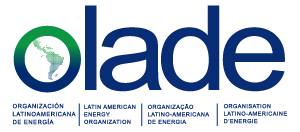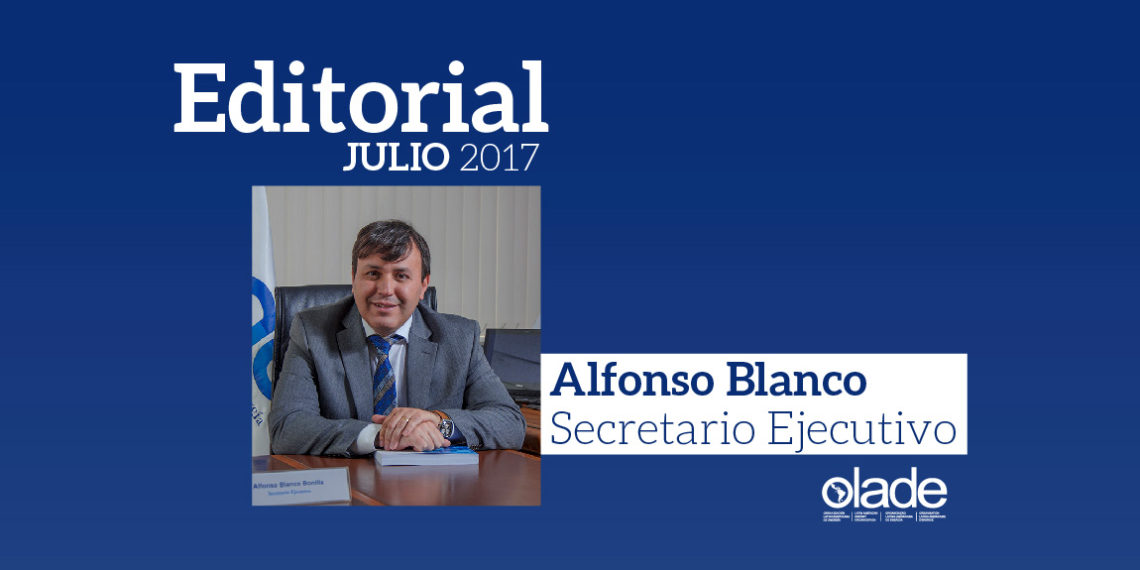Dear colleagues of the energy sector, taking up this monthly communication channel, I must confess that on this occasion I have gone through a process of reflection on the editorial guidelines of the newsletter.
I could tell you about the great advances at the management level of OLADE, about the Energy Week of December of this year, which we are organizing in Buenos Aires-Argentina; certainly very important topics that can be seen in the newsletter content. However, I have decided to seek to generate a process of reflection at the level of the readers and to put on the table, with the purpose of promoting dialogue and debate, many issues that I consider fundamental for our energy sector, in Latin America and the Caribbean.
For this reason I want to raise those issues that are critical for the development of the energy sector in LAC in the short and medium term, many of which are a fundamental part of my management plan at OLADE, but on which I understand that it is very convenient to generate a dialogue rich in its technical content, integrating contributions from governments, the private sector, civil society and academia.
On this occasion, I am going to use this first space for reflection to dedicate myself to tackling some of the fundamental aspects that our Region needs to deepen, and specifically referring to regional energy integration.
I understand that we have not yet exhausted in our Region the debate between sovereignty, energy autarky and integration. I am convinced of the benefits of integration, and I am also a strong promoter that integration does not threaten the sovereignty of our countries, but when properly implemented, it allows an efficient allocation of resources, which translates into benefit for our peoples, generating more robust systems and achieving a clear cost efficiency. Even more so in this historical period in which we have the capacity, through new technologies, to take advantage effectively and efficiently of the available resources and the complementarities that may exist between our energy systems at the subregional level.
However, why has this discussion in some cases been polarized, forming groups that in fact do not end up encouraging integrationist processes, and attribute to integration, effects contrary to national sovereignty? Why does our history of integration in the sector have many examples of discourses attractively adorned, with the image of a Latin America and the Caribbean, integrated and in practice that rhetoric often does not end up prospering, due to obstacles that operate in parallel to the discourse or the official will?
To answer these questions, I will present a brief analysis. Even though we have more successful examples of energy integration, of binational and regional content in LAC, than cases of failure, history and some specific failed events, of which I will not go into detail, have a high responsibility, generating marks difficult to erase in the general collective that block the integrationist will for prolonged periods of time.
This leads to the fact that collectively we have not been able to understand that, in the failed cases, the tool, in this case integration, is not to blame for the failure, but the cause lies in how it is applied; the erroneous analysis of the context and the lack of risk analysis in each failed integration process. We must therefore focus on how these integration processes are designed and implemented, and the scope that integration is intended to give within sector planning in each of our countries.
On the other hand, there are also discouragement positions due to the meager results attributable to established processes. In this regard, I understand that we have been too ambitious in the integrationist approaches. Very general political wills have been expressed many times, without an in-depth prior analysis of the technical and commercial implications and the effect these initiatives have on the internal politics of each country. If we add to this that in our Region the integration processes have been many times, throughout our history, associated with blocks of ideological affinity and have not been strictly the result of the approaches and analyzes that contemplate the efficiency in allocation of resources, the positive impacts at the level of energy security, or the complementary and intelligent use of available energy sources throughout our rich Region, from a perspective that is based on State policies. We are facing the evidence of many of the obstacles that we have faced in terms of regional integration.
You may expect a recipe on how to encourage integration, but I firmly believe that there is no such recipe, however, I can contribute some aspects that I understand are crucial to enhance integration in LAC.
A fundamental aspect is to generate a common awareness, at all levels, that is aimed at identifying and quantifying the benefits for our Region, associated with energy integration and that fundamentally respond to providing robustness, to our energy systems and to efficiency in the use, through exchanges that exploit the opportunities for complementary energy subsystems. I understand that gradual integration processes that are oriented at the level of groups of countries with shared interests, and identified complementarities, are actions with tangible and verifiable results that promote more ambitious integration processes in the future.
Another fundamental aspect refers to the need for the development of prospective studies, shared among countries that allow for optimized joint planning, which contemplates potential energy exchanges, the complementarity between subsystems and the restrictions at the level of the required infrastructure. The work of all the actors involved is very relevant as the starting point of any integration process, and the contribution of those who technically operate the systems, who know the operation from the inside and its limitations, cannot be ignored.
On the other hand, the need arises to harmonize the regulatory frameworks that allow fluid energy exchanges, reducing barriers at the commercial level, generating market and contractual conditions that enable business development between the different agents in the sector. This can put on the table the challenge of the need for supranational bodies, for the joint administration of markets.
Neither can we ignore the infrastructure needs, and the mechanisms for their financing, restrictions that are always present in our Region. A correct identification of the key projects for regional integration that allow and operationalize energy complementarity between subsystems is something strictly necessary for our entire Region.
Last, but not least, is the role of knowledge integration as a promoter of regional integration processes. Working in the exchange of experiences and fostering the interaction of research groups that operate as regional teams on topics of common interest is a catalyst for integration processes.
We may not have all the answers posed by the complexity of the subject, but we all have a share of responsibility, and moving forward in the search for them is the way to achieve higher levels of regional integration.
As you know, at OLADE we have been working deeply to enhance regional integration, addressing many of the issues that I have raised previously, however, there is still much to do, and that is one of our main challenges. In this sense, in our XII Regional Energy Integration Forum (FIER), which will take place on December 4 in Buenos Aires, Argentina, we hope to have a high-level technical and political exchange on the subject, and that the results of this exchange operate as a guide for the discussion on integration issues within the framework of the XLVII Meeting of Energy Ministers, to be held on December 6 and 7, also in the city of Buenos Aires, Argentina. I extend to the entire regional energy community the invitation for the XII edition of the FIER and to all the activities that will make up the so-called Energy Week, which we organize in coordination with the IDB and the Ministry of Energy and Mining of Argentina.
I hope with these reflections to generate a process of qualified dialogue between the energy community and that also integrates other visions on the subject for a discussion of strategic content, for our Region and I also hope that we meet in the beautiful city of Buenos Aires, in December this year to deepen the dialogue on these exciting topics.
I bid you farewell fraternally.
Alfonso Blanco
OLADE’s Executive Secretary


